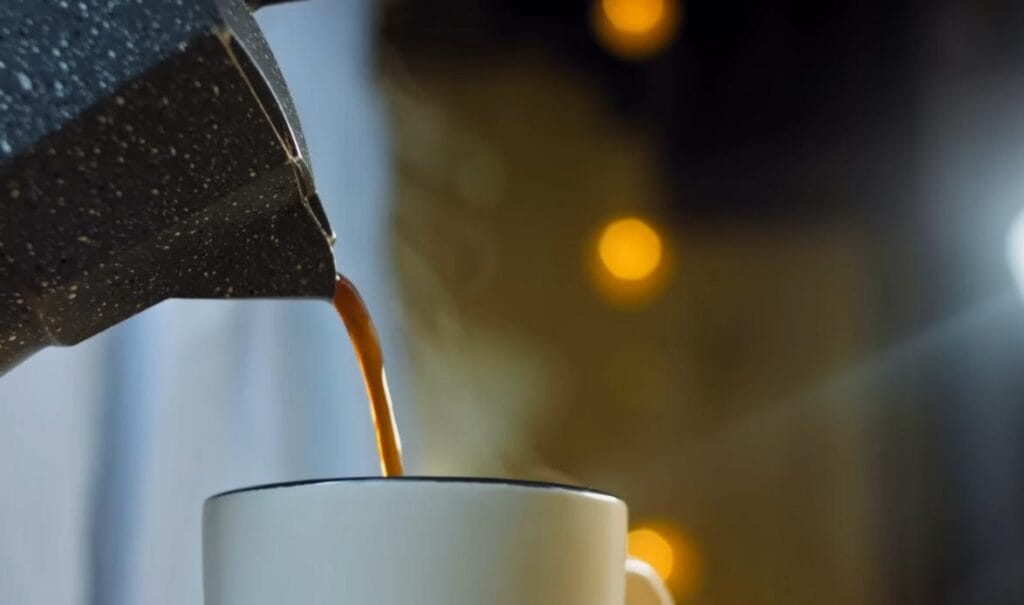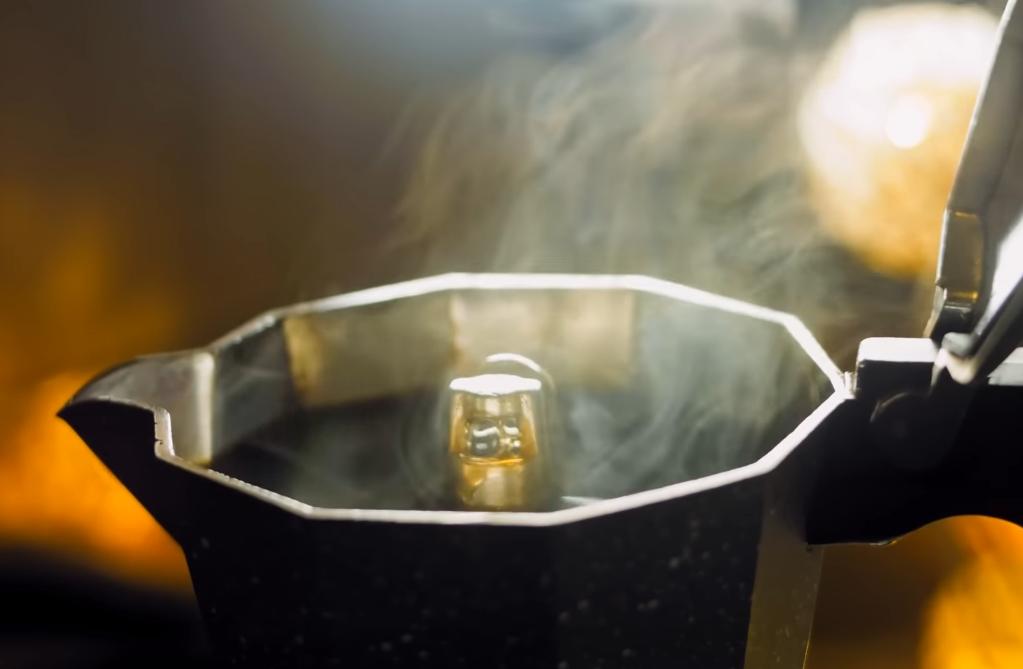Brewing coffee in aluminum Moka pots is usually safe. Some studies show that being around aluminum for a long time can be bad for your health. But the aluminum level leached into coffee from Moka pots is safe for most people.
This article will reveal the advantage and disadvantages of using aluminum moka pots and how safe they are compared to other moka pots made of different materials.
Read the rest to explore.
Concerns about Aluminum Moka Pots
Using aluminum moka pots has both positive and negative effects. Here are they in brief.
The good side of aluminum moka pots:
- The best thing about aluminum moka pots is they are excellent heat conductors that heat up quickly and evenly. It helps you to produce a consistent and flavorful cup of coffee.
- Aluminum is a lightweight material compared to other metals used for kitchen items. So, it is a handy coffee tool for people on the go.
- Compared to other moka pots, aluminum-made ones are more affordable.
The bad side of aluminum moka pots:
- Some individuals may be sensitive to aluminum toxicity because it can leach into coffee from a moka pot.
- A metallic taste in the coffee is a common complaint of aluminum moka pot users.
- Aluminum moka pots can react with acidic substances and make coffee taste irritating.
Read: Moka Pots Leaking Problem – Why and How to Fix
Maintaining the Safety of Aluminum Moka Pots

It is important to maintain the safety of aluminum Moka pots to ensure that they continue to function properly and safely. One way to do this is by cleaning and maintaining the pot regularly.
It is essential to clean the pot after each use to prevent the buildup of coffee oils and residue. The best way to clean a Moka pot is by rinsing it with hot water and wiping it down with a clean, damp cloth.
It is also important to use the pot correctly. The pot should be filled with cold water and coffee grounds, and then placed on the stove-top over low to medium heat.
Another crucial fact is to monitor the pot during the brewing process to ensure that the coffee does not boil or scorch. Overheating the pot can cause the coffee to become bitter and can also damage the pot.
Lastly, it is important to replace and upgrade the Moka pot when necessary. Over time, the pot may become worn or damaged, which can affect its performance and safety. It is recommended to replace the pot every two to three years, or when it shows signs of wear and tear.
What Materials Are Used For Moka Pots?
Aluminum, stainless steel, cast iron, and ceramic are the four common materials used to manufacture Moka pots.
Aluminum is the most popular choice for Moka pots because of its lightweight and quick-heating nature. But it has a risk of discoloration and can affect the taste of coffee.
Stainless steel is the second common option that causes no reaction with coffee. It is popular among users who are concerned about taste and want to avoid cleaning and maintaining hassle.
Cast iron is a heavy-duty option and provides optimal heat retention. However, it is prone to rust and can affect the taste of the coffee.
Ceramic moka pots are unique. They are a good option for users looking for traditional and decorative items. It is also a good heat conductor and does not affect the taste of the coffee. But ceramic is fragile and may crack accidentally.

Comparisons between Aluminum and Other Moka Pots
How convenient are aluminum moka pots compared to others? This section will clarify all confusion. Check the following charts and make a wise purchasing decision.
Aluminum Vs. Stainless Steel Moka Pots
| Aluminum | Stainless steel | |
| Health & safety | Can leach into coffee when overheated. People sensitive to aluminum can feel discomfort. | Doesn’t leach and causes no reaction with coffee and other beverages. |
| Durability | Can dent and deform easily. | Very durable but can develop scratches. |
| Heat conductivity | Excellent heat conductor. | Good, but not as aluminum. |
| Maintenance | Risk of discoloration and require routine cleaning. | Very easy to clean. |
| Good for | Lightweight and quick heating. | Durability and fresh-tasting coffee. |
The Winner: Stainless steel Moka pots are better than aluminum if you prefer the durability and the taste of coffee. You can find more details differences between moka pot steel and aluminum.
Aluminum Vs. Cast Iron Moka Pots
| Aluminum | Cast Iron | |
| Health & safety | Safe in general unless it leaches into coffee. | Safe for health but can affect the taste of coffee. |
| Durability | Less durable compared to cast iron. | Heavy and durable, but prone to rust and cracking. |
| Heat conductivity | Excellent for quick heating and achieving optimal temperature for brewing. | Doesn’t heat quickly as aluminum but is good for heat retention. |
| Maintenance | Can be discolored over time. | Can develop rust and requires regular maintenance. |
| Good for | Quick heating and high-quality brewing. | Durability and as a traditional item. |
The winner: Aluminum moka pots have many advantages over cast iron, considering the brewing quality and maintenance.
Aluminum Vs. Ceramic Moka Pots
| Aluminum | Ceramic | |
| Health & safety | Generally considered safe but can leach when overheated. | Widely praised as a food-grade item. |
| Durability | Durable and lightweight. | Fragile and can crack easily. |
| Heat conductivity | Awesome heat conductor. | Nice heat conductor, but not good as aluminum. |
| Maintenance | Regular cleaning is required to avoid discoloration. | Easy to clean, but needs careful maintenance. |
| Good for | Can be used roughly. | An excellent decorative item for hobbyists. |
The winner: Aluminum moka pots offer more durability and lower maintenance efforts compared to ceramic moka pots.
The above comparisons show that aluminum is a perfect material for moka pots for all types of coffee enthusiasts. Unlike other materials, it is more convenient for users, including brewing quality and optimal heat conductivity.

FAQs on Moka Pot Safety:
High temperatures above 400°F can cause aluminum leaching. But studies indicate that this is not harmful to healthy adults.
Yes! Aluminum can react with coffee in rare cases. But experts assure that there is minimal risk associated with brewing coffee in aluminum pots.
As a natural metal, aluminum does not contain BPA. However, some aluminum products come coated with different materials that can contain BPA.
Final Thought
Millions of people worldwide are brewing their coffees in aluminum moka pots without any health issues. In rare cases, aluminum can leach into coffee and cause health problems. Regular cleaning of the aluminum moka pot can help prevent toxicity and discoloration.
Moreover, users now have several alternative options, such as stainless steel or ceramic moka pots that are considered safe for health. Whether you use an aluminum moka pot or not is up to you, considering your specific needs and preferences.